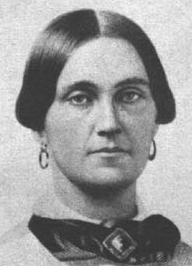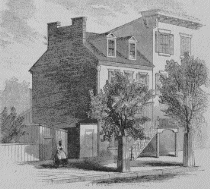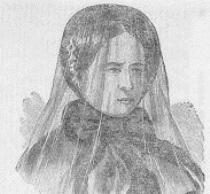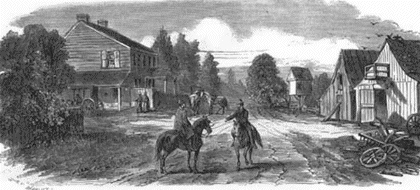
1823-1865
Biographic Sketch of Mary Surratt
Mary Surratt's Role in the Conspiracy
Frederick Aiken's Defense of Mary Surratt
Images



Biographic Sketch of Mary Surratt
Mary Jenkins, born in Waterloo, Maryland and schooled in a Catholic female seminary, married John Surratt at age seventeen. In 1853, the Surratts bought 287 acres of land in Prince George's County--about a two-hour horse ride from Washington. Surratt built a tavern and a post office, and the property became known as Surrattsville. (During the Civil War, the tavern apparently served as a safehouse in the Confederate underground network.) The couple raised three children, Isaac, Anna, and John Jr.
In 1864, two years after John Surratt died, Mary Surratt decided to move to house she owned in Washington at 541 High Street. The tavern in Surrattsville she rented to an ex-policeman named John Lloyd, who would later provide the key evidence against her in the conspiracy trial.
Mary Surratt's Role in the Conspiracy
Mary Surratt's eldest son, John, served in the Civil War as a Confederate secret agent. John Surratt's acquaintances included many of the key figures in the assassination conspiracy, including John Wilkes Booth, George Atzerodt, David Herold, and Lewis Powell.
Lewis Weichmann, who attended college with John Surratt, resided at Mary Surratt's boarding house in Washington during the period in which the conspiracy plot was hatched. Weichmann, although describing his landlord as "exemplary" in character and "lady-like in every particular," provided testimony that incriminated Mary Surratt. He described numerous private conversations in the Surratt house between Mary and Booth, Powell, and other conspirators. Typically, according to Weichmann, Booth would ask Mary--if John were not at home--if she could "go upstairs and spare a word." He testified that on April 2 Mary Surratt asked him "to see John Wilkes Booth and say that she wished to see him on 'private business'"--and that Booth visited with her in her home that evening. He told of Booth giving him $10 on the Tuesday before the assassination which he was to use to hire a buggy to take Mary Surratt to Surrattsville to collect--according to Surratt--a small debt.
On the day of the assassination, April 14, Mary Surratt sent Weichmann to hire a buggy for another two-hour ride to Surrattsville. Weichmann reported that Surratt took along "a package, done up in paper, about six inches in diameter." Surratt and Weichman arrived sometime after four at Surratt's tavern. Surratt went inside while Weichmann waited outside or spent time in the bar. Surratt remained inside about two hours. Between six and six-thirty, shortly before the began their return trip to Washingon, Weichmann saw Mary Surratt speaking privately in the parlor of the tavern with John Wilkes Booth. At nine o'clock, Surratt saw Booth for a last time when he visited her home in Washington. After the visit, according to Weichmann, Surratt's demeanor changed--she became "very nervous, agitated and restless."
Less than seven hours later, as the President lay dying and Booth having fled, investigators paid an initial visit to the Surratt home. When the investigators left, Surratt reportedly exclaimed to her daughter, "Anna, come what will, I am resigned. I think J. Wilkes Booth was only an instrument in the hands of the Almighty to punish this proud and licentious people." [Weichmann affidavit, 8/11/1865]
On April 17, shortly after eleven at night, a team of military investigators again arrived at the Surratt home to interview her and other residents about the assassination. While they were doing so, Lewis Powell, carrying a pick-axe, knocked on the door. When he claimed to have been hired by Mary Surratt to dig a gutter, Surratt was asked whether she could confirm his story. Surratt answered, "Before God, sir, I do not know this man, and have never seen him, and I did not hire him to dig a gutter for me." While in the Surratt home, investigators uncovered various pieces of incriminating evidence, including a picture of John Wilkes Booth hidden behind another picture on a mantelpiece. Facing arrest, Surratt asked a minute to kneel and pray.
Mary Surratt at Trial
According to Thomas Harris, a member of the Military Commission that tried Surratt, the most damning evidence against her came from Surrattsville tavernkeeper John Lloyd. Lloyd told the Commission that five to six weeks before the assassination John Surratt, David Herold, and George Atzerodt came to Surrattsville to drop off at his tavern two carbines, ammunition, about twenty feet of rope, and a monkey wrench. The men asked them Lloyd to conceal them, with Surratt suggesting a hiding place under joists in a second-floor room.
Lloyd testified that three days before the assassination, Mary Surratt told him that "the shooting irons" left at his place by the men weeks ago would be needed soon. Then on the day of the assassination, Surratt again brought up the subject, according to Lloyd's testimony:
On the 14th of April I went to Marlboro to attend a trial there; and in the evening, when I got home, which I should judge was about 5 o'clock, I found Mrs. Surratt there. She met me out by the wood-pile as I drove in with some fish and oysters in my buggy. She told me to have those shooting-irons ready that night, there would be some parties who would call for them. She gave me something wrapped in a piece of paper, which I took up stairs, and found to be a field-glass. She told me to get two bottles of whisky ready, and that these things were to be called for that night.
Just about midnight on Friday, Herold came into the house and said, "Lloyd, for God's sake, make haste and get those things." I did not make any reply, but went straight and got the carbines, supposing they were the parties Mrs. Surratt had referred to, though she didn't mention any names. From the way he spoke he must have been apprised that I already knew what I was to give him. Mrs. Surratt told me to give the carbines, whisky, and field-glass. I did not give them the rope and monkey-wrench. Booth didn't come in. I did not know him; he was a stranger to me. He remained on his horse. Herold, I think, drank some out of the glass before he went out.
I do not think they remained over five minutes. They only took one of the carbines. Booth said he could not take his, because his leg was broken. Just as they were about leaving, the man who was with Herold said, "I will tell you some news, if you want to hear it," or something to that effect. I said, "I am not particular; use your own pleasure about telling it." "Well, said he, "I am pretty certain that we have assassinated the President and Secretary Seward."
Another prosecution witness, George Cottingham told the Commission that after learning of the assassination John Lloyd had cried, "Oh, Mrs. Surratt, that vile woman, she has ruined me! I am to be shot! I am to be shot!"
Surratt's attorney, Frederick Aiken, argued that Lloyd's evidence should be disbelieved because he was "a man addicted to the excessive use of intoxicating liquors" and was motivated to "exculpate himself by placing blame" on Mary Surratt.
The Military Commission--relying heavily on the testimony of Lloyd-- found Mary Surratt guilty of conspiracy and sentenced her to death. Five of the nine Commission members, in the record transmitted to President Johnson for his review, recommended that the President--because of "her sex and age"-- reduce Surratt's punishment to life in prison. Johnson refused to change the sentence, describing Surratt as having "kept the nest that hatched the egg."
After a last-ditch effort to delay her prosecution by way of a writ of habeas corpus failed when President Johnson declared the writ suspended for this case, Surratt was hanged on July 7, 1865 along with three other conspirators. Surratt became the first woman executed by the United States.
The execution of Surratt came under considerable criticism in some quarters. H. L. Burnett, who served on the Commission, defended the sentence: "Whomever indulges in wide-mouthed proclamations, or pronounces her conviction 'an inhuman crime,' unsupported by evidence, betrays an animus, to say the least, not overcareful of truth."
